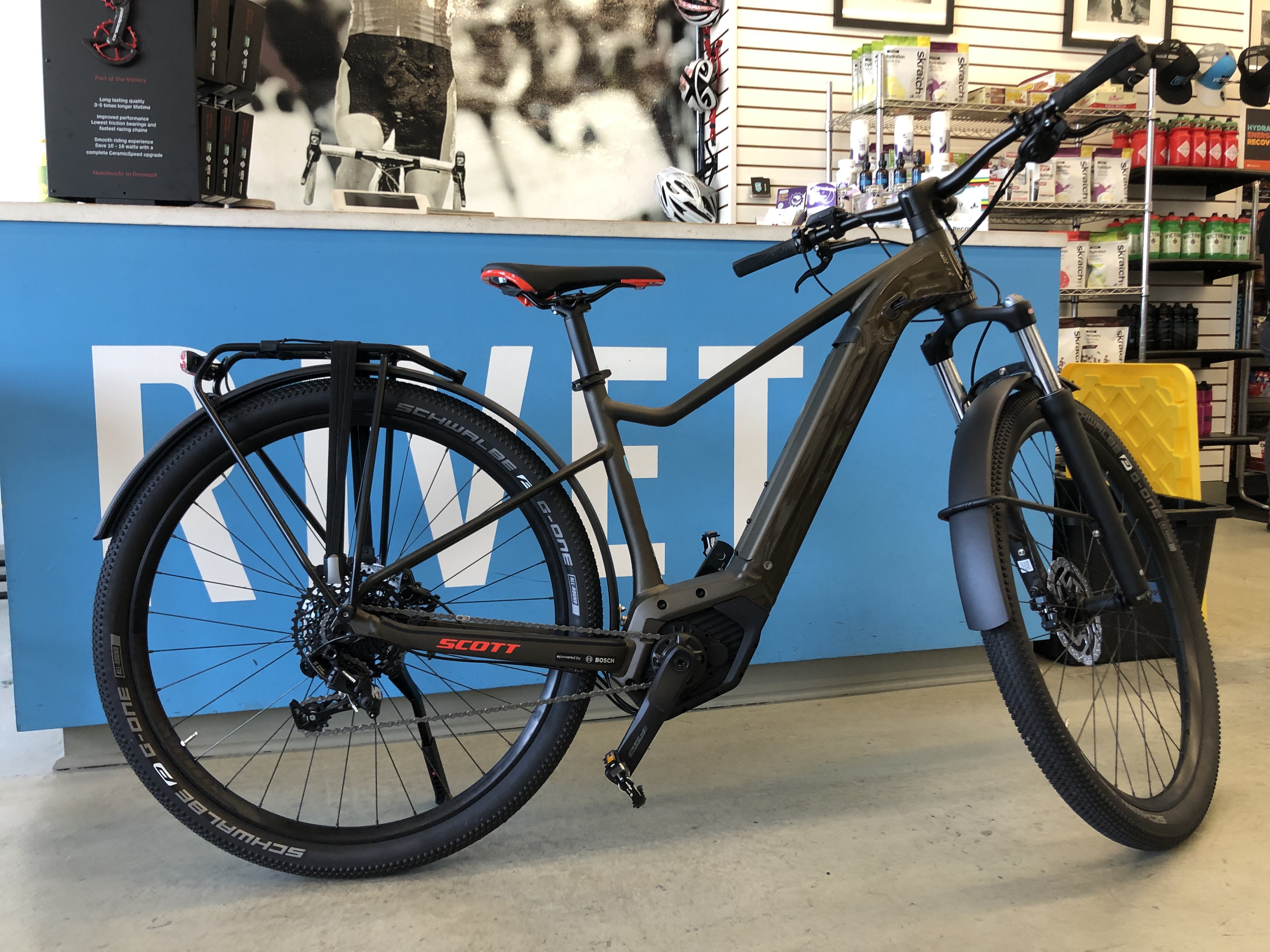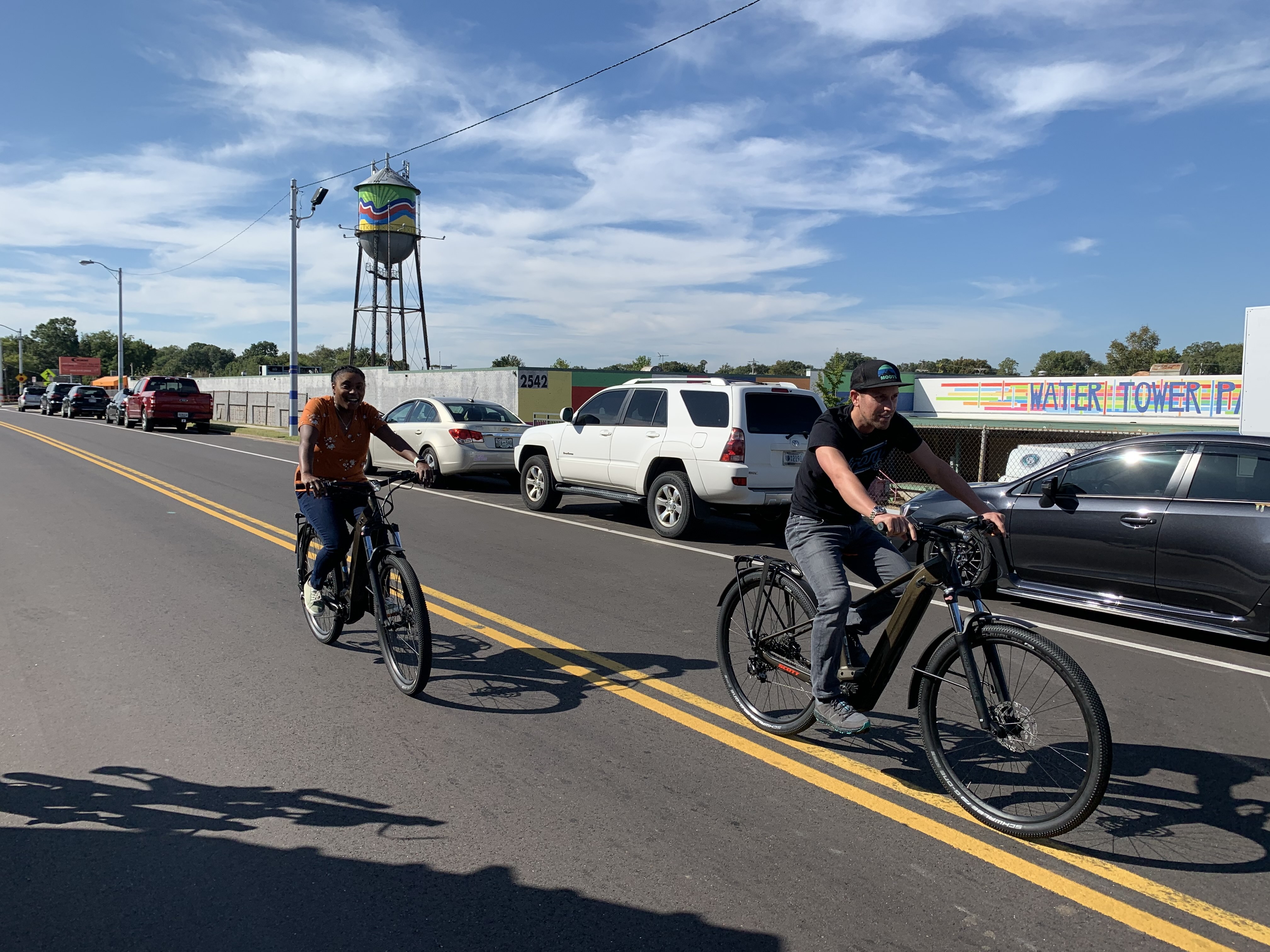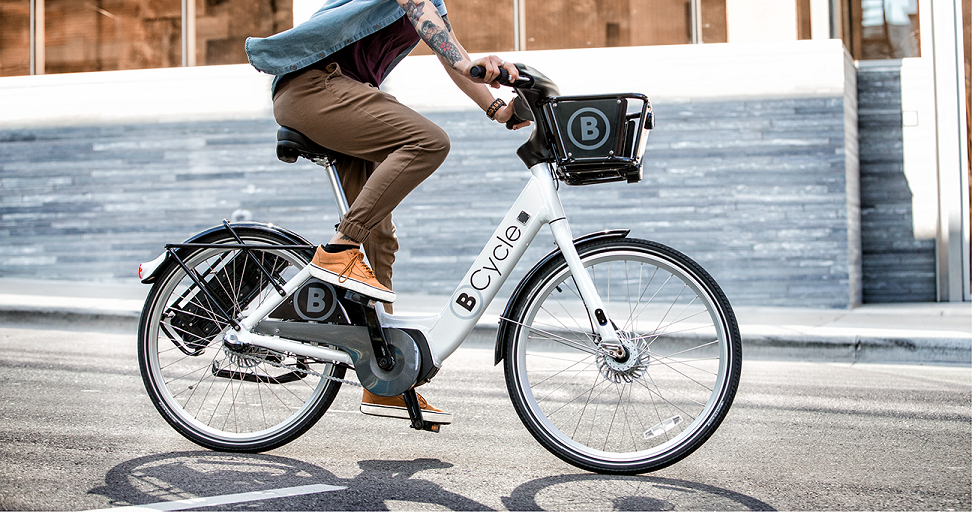
A Scott e-bike available for demo at Victory
Victory Bicycle Studio wants to help Memphians get around the city in a new way with electric-assist bikes.
The store introduced the Electric Bike Demo Program this month. The program allows customers to demo e-bikes for three days for $200 to decide if it’s right for them. If an e-bike is purchased within 30 days of the demo period, that $200 will go toward the overall cost of the bike.
Clark Butcher, owner of Victory said the demo program is a way for customers to try e-bikes “with no obligations” in the “real world, not cruising around the parking lot.”
“Full disclosure, I don’t consider myself a pioneer,” Butcher said. “I consider myself as one who listens to what folks want. Everyone comes in and they go ‘Do you have e-bikes?’ Everybody has the same response — ‘No, but we can order them.’ Well, here it’s different. You can actually leave with an e-bike today.”
In the last four years, Butcher said Victory has sold about four e-bikes, but in the past four months, Butcher said the shop has sold about four each month. Butcher said requests for e-bikes “keep coming,” so “obviously there is a demand there.”
[pullquote-1]
For the past nine years, Victory has only been ordering one e-bike at a time based on individual customer requests. But now, it’s something they intend to permanently keep in stock, Butcher said.
Offering customers a chance to demo the bikes is meant to address people’s hesitations with buying an e-bike, such as the price and feasibility.
“It’s so new,” Butcher said. “I mean it’s alternative transportation so this is a way to have it for a couple of days. It’s not a rental. It’s a demo. You get to see if it fits up and down your apartment stairs, you need to make sure you’ve got a safe place to keep it, that you have a route dialed in. We understand that buying an e-bike is a significant investment.”
Typically, e-bikes cost $2,000 and up. To help with the cost, Victory offers six-month and one-year payment deferment plans with no interest.
Butcher said Victory’s demo program will “hopefully run indefinitely.”

Butcher shows the Flyer’s Maya Smith how e-bikes work
How Do E-bikes Work?
E-bikes work very similar to traditional bikes. Just as one would do riding a push bike, e-bikes riders pedal to get going and keep going. Each time the rider pedals, the e-bike motor is activated, augmenting the rider’s efforts. Victory’s e-bikes can go as fast as 28 miles per hour, Butcher said.
The less efficient the mode, the more work the rider has to do. Turn it up to turbo mode, and the rider only does 20 percent of the work. However, even in turbo, Butcher said riders get a workout: “You’ve got to turn those pedals in order for it to keep going.”
Because the motor can do up to 80 percent of the work, Butcher said e-bikes are good for Memphis summers and an alternative to traditional bikes for new riders, riders who are not as physically fit, and those with longer commutes.
The bikes are charged using standard wall outlets and can reach full charge in about four hours. With a full battery, they can run for 20 to 65 miles depending on the mode.
E-Bike Sharing
Explore Bike Share (EBS) is also exploring e-bikes. The non-profit plans to introduce 300 electric-assist bikes to its system by April 2020. EBS is working with its vendor to provide e-bikes that will meet the needs of the city and be compatible to its current system.
Trey Moore, executive director of EBS, said adding e-bikes is a part of the non-profit’s efforts to reduce barriers that keep people from using bike share. Those barriers could include the Memphis heat, long commutes, or a rider’s physical condition.
With e-bikes, Moore said riders can travel farther faster and climb “virtually any hill” without “sweating the commute.”
[pullquote-2]
“E-bike will be empowering in every sense of the word,” Moore said. “Now that EBS has launched its initial fleet, we believe that by embracing e-bikes, we’ll see more people on bikes more often. From older riders to those with longer commutes, ebikes will provide an important alternative.”
Ultimately, Moore said adding e-bikes to the system will help EBS deliver “on the mission of connecting our city.”
As shared mobility is continues to “evolve and mature,” Moore said e-bikes are starting to pop up in more cities. He notes that in cities where e-bikes have been added to bike share systems, there’s a significant increase in the number of daily rides.
BCycle, the company that EBS partnerships with to provide bikes here, first introduced its e-bike in November.
 BCycle
BCycle
BCycle rolled out e-bikes last year
Since then the company has added e-bikes to bike share systems in half a dozen cities, such as Los Angeles, Fort Worth, and Madison, Wisconsin, where the entire fleet has been electric since June. It was the first U.S. city to overhaul its bikeshare system with e-bikes.
After Madison’s entire fleet was replaced with 300 e-bikes, the number of trips taken there this summer was more than double last summer’s number, BCycle head Morgan Ramaker wrote in a column for the Wisconsin State Journal late last month.
Companies like Lyft and Uber are also exploring the e-bike landscape. Lyft e-bikes are now available in San Francisco, while JUMP e-bikes, owned by Uber, are available in 15 U.S. and five European cities.
Electric Future
Butcher said he believes “it’ll take just a second” for e-bikes to become more widespread in Memphis.
“E-bikes have been in the media, the press, the tech industry for years now,” Butcher said. “It keeps getting better and better. Before the price was so extreme and they were so heavy that no one would buy them. But with mass manufacturing and more sales, things are getting faster and more efficient and the price is coming down.”
Victory’s decision to sell more e-bikes corresponds to the city’s “consistent effort in putting in bike lanes,” while improving alternative transportation and infrastructure, Butcher said.
“I think three years ago was too soon,” Butcher said. “But, right now, is the time I think a lot of smart people in bigger cities are doing it. We should too.”